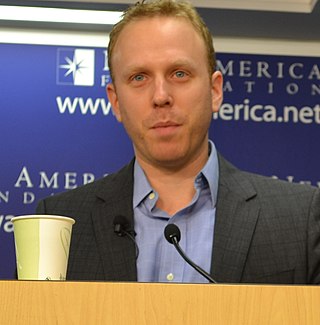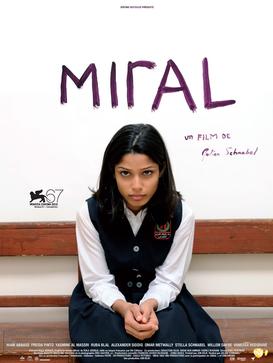Accuracy in Media (AIM) is an American non-profit conservative news media watchdog founded in 1969 by economist Reed Irvine.

Benjamin "Bibi" Netanyahu is an Israeli politician who has been serving as the prime minister of Israel since 2022, having previously held the office from 1996 to 1999 and again from 2009 to 2021. He is the chairman of the Likud party. Netanyahu is the longest-tenured prime minister in the country's history, having served for a total of over 16 years. He is also the first prime minister to have been born in Israel after its establishment.

Mohammed Amin al-Husseini was a Palestinian Arab nationalist and Muslim leader in Mandatory Palestine. Al-Husseini was the scion of the al-Husayni family of Jerusalemite Arab nobles, who trace their origins to the Islamic Prophet Muhammad.

Media coverage of the Arab–Israeli conflict by journalists in international news media has been said to be biased by both sides and independent observers. These perceptions of bias, possibly exacerbated by the hostile media effect, have generated more complaints of partisan reporting than any other news topic and have led to a proliferation of media watchdog groups.

Saeb Muhammad Salih Erekat was a Palestinian politician and diplomat who was the secretary general of the executive committee of the PLO from 2015 until his death in 2020. He served as chief of the PLO Steering and Monitoring Committee until 12 February 2011. He participated in early negotiations with Israel and remained chief negotiator from 1995 until May 2003, when he resigned in protest from the Palestinian government. He reconciled with the party and was reappointed to the post in September 2003.
The Council for the National Interest ("CNI") is a 501(c)(4) non-profit, non-partisan anti-war advocacy group focused on transparency and accountability about the relationship of Israel and the United States and the impact their alliance has for other nations and individuals in other Middle East countries. Based in the United States and most active during the 2000s decade, the Council has highlighted Israel's disposition towards its neighbors, and how Middle Eastern nations, Palestinian rights and other aspects of Middle East life & relations are impacted by the Israel's policies and its financial, trade, and military relationships with the US. They have focused on popular sentiment and perceptions in the US and the between the two countries. They highlight how these policies have impacted the fate of Palestine and, treatment of Muslims within the US since the 1990s.
If Americans Knew is a nonprofit organization based in Riverside County in Southern California, that focuses on the Israeli–Palestinian conflict and the foreign policy of the United States regarding the Middle East, offering analysis of American media coverage of these issues. The group's website declares its aim is to provide "what every American needs to know about Israel/Palestine." The site is critical of U.S. financial and military support of Israel. It has accused The New York Times and other mainstream news organizations of being biased in favour of Israel.

Hussein Yusuf Kamal Ibish is a senior resident scholar at the Arab Gulf States Institute in Washington. He is a weekly columnist for Bloomberg and The National (UAE) and is also a regular contributor to many other U.S. and Middle Eastern publications. He has made thousands of radio and television appearances and was the Washington, DC correspondent for The Daily Star (Beirut). Many of Ibish's articles are archived on his Ibishblog website.

Norman Solomon is an American journalist, media critic, activist, and former U.S. congressional candidate. Solomon is a longtime associate of the media watch group Fairness & Accuracy In Reporting (FAIR). In 1997 he founded the Institute for Public Accuracy, which works to provide alternative sources for journalists, and serves as its executive director.

Rashid Ismail Khalidi is a Palestinian-American historian of the Middle East and the Edward Said Professor of Modern Arab Studies at Columbia University. He served as editor of the Journal of Palestine Studies from 2002 until 2020, when he became co-editor with Sherene Seikaly.

Khaled Abu Toameh is an Israeli Arab journalist, lecturer and documentary filmmaker.

Peace, Propaganda & the Promised Land is a 2004 American documentary film directed by Sut Jhally and Bathsheba Ratzkoff which—according to the film's official website—"provides a striking comparison of U.S. and international media coverage of the crisis in the Middle East, zeroing in on how structural distortions in U.S. coverage have reinforced false perceptions of the Israeli–Palestinian conflict" and which "analyzes and explains how—through the use of language, framing and context—the Israeli occupation of the West Bank and Gaza remains hidden in the news media". The film argues that the influence of pro-Israel media watchdog groups, such as CAMERA and Honest Reporting, has led to distorted and pro-Israel media reports. It features Noam Chomsky, Robert Jensen, Hanan Ashrawi, Sam Husseini, and Robert Fisk, among others.

Max Blumenthal is an American author and blogger. He was a writer for The Nation, AlterNet, The Daily Beast, Al Akhbar, Mondoweiss, and Media Matters for America, and has contributed to Al Jazeera English, The New York Times and the Los Angeles Times. He has been a writing fellow of the Nation Institute. He is a regular contributor to Russian state-owned Sputnik and RT.
Mondoweiss is a news website that began as a general-interest blog written by Philip Weiss on The New York Observer website. It subsequently developed into a broader collaborative venture after fellow journalist Adam Horowitz joined it as co-editor. In 2010, Weiss described the website's purpose as one of covering American foreign policy in the Middle East from a 'progressive Jewish perspective'. In 2011, it defined its aims as fostering greater fairness for Palestinians in American foreign policy, and as providing American Jews with an alternative identity to that expressed by Zionist ideology, which he regards as antithetical to American liberalism. Originally supported by The Nation Institute, it became a project of part of the Center for Economic Research and Social Change in June 2011.

Miral is a 2010 biographical political film directed by Julian Schnabel about the coming of age of a Palestinian girl named Miral who grows up in the wake of the 1948 Arab–Israeli War and finds herself drawn into the conflict. The screenplay was written by Rula Jebreal, based on her novel of the same name. The film was released on 3 September at the 2010 Venice Film Festival and on 15 September 2010 in France. The film was set for release on 3 December 2010 in the United Kingdom, and on 25 March 2011 in the United States. Miral was initially rated R by the MPAA for "some violent content including a sexual assault." Later, however, it was reclassified to PG-13 for "thematic material, and some violent content including a sexual assault" after an appeal of the R rating by the Weinstein Company.

Israel–United Arab Emirates relations had been jagged and fueled by mutual distrust and hatred for several decades, but in the 2010s, the countries' informal relations improved considerably and they began engaging in extensive unofficial cooperation based on their joint opposition to Iran's nuclear program and regional influence. In 2015, Israel opened an official diplomatic mission in Abu Dhabi to the International Renewable Energy Agency.

The Trump peace plan, officially titled "Peace to Prosperity: A Vision to Improve the Lives of the Palestinian and Israeli People", was a proposal by the Trump administration to resolve the Israeli–Palestinian conflict. President Donald Trump formally unveiled the plan in a White House press conference alongside Israeli Prime Minister Benjamin Netanyahu on 28 January 2020. The plan had been delayed by two years and previously rejected by the Palestinians, who were not invited to the meeting.

The Israel–United Arab Emirates normalization agreement, officially the Abraham Accords Peace Agreement: Treaty of Peace, Diplomatic Relations and Full Normalization Between the United Arab Emirates and the State of Israel, was initially agreed to in a joint statement by the United States, Israel and the United Arab Emirates (UAE) on August 13, 2020, officially referred to as the Abraham Accords. The UAE thus became the third Arab country, after Egypt in 1979 and Jordan in 1994, to agree to formally normalize its relationship with Israel, as well as the first Persian Gulf country to do so. Concurrently, Israel agreed to suspend plans for annexing parts of the West Bank. The agreement normalized what had long been informal but robust foreign relations between the two countries. The agreement was signed at the White House on September 15, 2020. It was approved unanimously by the Israeli cabinet on October 12 and was ratified by the Knesset on October 15. The UAE parliament and cabinet ratified the agreement on October 19. The agreement went into effect on January 5, 2021.

The Abraham Accords are bilateral agreements on Arab–Israeli normalization signed between Israel and the United Arab Emirates and Bahrain on September 15, 2020. Mediated by the United States, the initial announcement of August 13, 2020, concerned only Israel and the United Arab Emirates before the announcement of a follow-up agreement between Israel and Bahrain on September 11, 2020. On September 15, 2020, the official signing ceremony for the first iteration of the Abraham Accords was hosted by the Trump administration at the White House. As part of the dual agreements, both the United Arab Emirates and Bahrain recognized Israel's sovereignty, enabling the establishment of full diplomatic relations.

Aaron Maté is a Canadian writer and journalist. He hosts the show Pushback with Aaron Maté on The Grayzone and, as of January 2022, he fills in as a host on the Useful Idiots podcast. Maté has worked as a reporter and producer for Democracy Now!, Vice, The Real News Network, and Al Jazeera, has contributed to The Nation, and has appeared several times on Fox News on Tucker Carlson Tonight.















